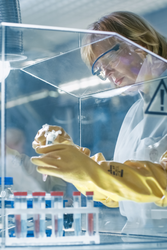Unveiling the Essentials: Must-Have Equipment for the Pathology Lab
20th Dec 2023
The world of pathology plays a crucial role in healthcare, providing vital information for diagnosis, treatment planning, and disease monitoring. This intricate field relies heavily on specialized equipment to analyze tissues, cells, and bodily fluids with precision and accuracy. But with a vast array of options available, navigating the essential tools for a pathology lab can be daunting.
This blog aims to shed light on some of the must-have equipment in a pathology lab, categorized into three key areas:
1. Specimen Processing and Preparation:
- Microtomes: These intricate machines slice tissue samples into ultra-thin sections, typically ranging from 5 to 10 microns. These sections are then mounted on slides for microscopic examination.
- Tissue Processors: These automated systems efficiently process tissue samples through various steps like fixation, dehydration, clearing, and paraffin embedding. This process prepares the tissue for sectioning on the microtome.
- Embedding Stations: These workstations provide a controlled environment for embedding tissue samples in paraffin wax. Paraffin wax encases the tissue, allowing for consistent sectioning and staining.
- Staining Supplies: A wide range of stains and reagents are essential for visualizing different elements within the tissue sections. Hematoxylin and eosin (H&E) stain is the most commonly used, while immunohistochemistry (IHC) and special stains are employed for specific diagnoses.
- Histology Equipment: This category encompasses tools like water baths, staining racks, and coverslippers, which are used during various processing and staining steps.
2. Microscopic Examination:
- Light Microscopes: These workhorses of any pathology lab allow for detailed examination of tissue sections at different magnifications. Modern light microscopes often come with digital cameras for capturing images and generating digital slides.
- Immunofluorescence Microscopes: This specialized type of microscope utilizes fluorescent tags to visualize specific proteins or molecules within the tissue, aiding in diagnosis of certain diseases.
- Digital Pathology Systems: These systems enable the creation, storage, and analysis of digital slides generated by microscopes. They offer advantages like remote consultation, image sharing, and improved workflow efficiency.
3. Additional Essential Equipment:
- Biosafety Cabinets: These enclosed workstations provide a safety barrier for personnel when handling potentially infectious specimens. They filter airborne contaminants, protecting the user and preventing environmental contamination.
- Refrigerators and Freezers: Maintaining proper temperature is crucial for preserving tissue samples and reagents. Refrigerators are used for short-term storage, while freezers are essential for long-term storage of tissues and other materials.
- Laboratory Information Systems (LIS): These computer systems manage patient data, laboratory results, and reports, streamlining workflow and ensuring efficient data management within the lab.
Beyond the Essentials:
While this blog focuses on essential equipment, several advanced technologies are playing an increasingly important role in pathology. These include:
- Flow Cytometry: This technique analyzes individual cells based on their size, granularity, and surface markers, aiding in the diagnosis of blood cancers and other conditions.
- Molecular Diagnostics: This field utilizes various techniques to analyze DNA and RNA from tissue samples, providing insights into genetic mutations and gene expression patterns associated with disease.
- Telepathology: This technology allows for remote consultation between pathologists, enabling expert opinion to be sought regardless of physical location.
The specific equipment needs of a pathology lab will vary depending on its size, workload, and sub-specialties. However, the tools mentioned above represent a critical foundation for any facility, ensuring high-quality, accurate diagnoses that ultimately contribute to better patient care.
Contact us today to learn more about how we can help you achieve your healthcare supply chain goals.
(732) 447-1100 // info@cenmed.com

